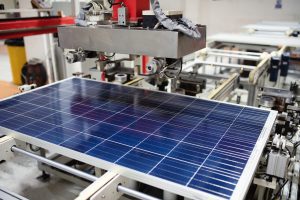The U.S. Commerce Department yesterday announced the imposition of preliminary duties on the imports of solar cells and panels from four Southeast Asian nations, in a victory for domestic panel makers who claim that cheap imports are undermining their operations.
Back in May, the Commerce Department announced that it was initiating antidumping and countervailing duty investigations of crystalline silicon photovoltaic (PV) cells from Cambodia, Malaysia, Thailand, and Vietnam. The probe came a month after the filing of a case by the American Alliance for Solar Manufacturing Trade Committee, which brings together seven leading solar producers, including South Korea’s Hanwha Qcells USA Inc., Switzerland’s Meyer Burger, Norway’s REC Silicon, and the U.S. firms First Solar Inc. and Mission Solar Energy LLC.
The Committee argued that Chinese companies with factories in the four nations have benefitted from unfair Chinese government subsidies, and flooded the U.S. market with panels priced below the cost of production. This has caused prices to crash by more than 50 percent, threatening their hefty investments in U.S. solar manufacturing. It asked the Biden’s administration to impose tariffs on panels and cells from the four countries.
In August, the Commerce Department determined that solar cells and modules produced in Cambodia, Malaysia, Thailand, or Vietnam using components from China, and then exported to the United States, were circumventing its existing antidumping and countervailing duty orders on solar cells from China.
In yesterday’s ruling, the Commerce Department said that anti-subsidy countervailing duties will henceforth be applied to all solar imports from the four Southeast Asian nations, which collectively made up around 80 percent of U.S. imports in 2023 in dollar terms, according to Reuters.
Commerce has set preliminary general rates at 8.25 percent for Cambodia; 9.13 percent for Malaysia; 23.06 percent for Thailand; and 2.85 percent for Vietnam. It has also determined different rates for specific companies. For many imports from Thailand and Vietnam, rates will apply retroactively, going back 90 days to early July. This is the product of a separate complaint from the Committee, which argued that PV cell exports from Vietnam and Thailand surged after reports about the trade investigation began circulating in the middle of the year.
According to Reuters, the rates set by Commerce are lower than many anticipated, though they could rise when the Commerce Department issues its final order, which is expected in April. Tim Brightbill, an attorney with Wiley Rein in Washington, told reporters that “some of the margins definitely do not yet reflect the full extent of government subsidies that are occurring in the industry,” and said that Commerce could increase the duties in its final decision.
Yesterday’s announcement is also the first of two preliminary decisions expected this year in the case. The second, involving the Committee’s claims that solar imports from the targeted countries are being dumped on the U.S. market at prices below the cost of production, will be announced next month.
The Commerce Department’s decision reflects the manner in which Chinese firms have responded to U.S. tariffs and duties by shifting production to third countries where such measures are not in place. Given the extent to which Southeast Asian supply chains are tied up with those originating in China, this augurs the imposition of more duties on the region as Washington seeks to hamstring Chinese producers and protect its own markets.
However, the current protectionist measures could have unintended consequences, especially on U.S. companies that rely on cheap solar imports. It also has the potential to constrain the U.S.’s ability to accelerate its green energy transition. According to Bloomberg, the case “has drawn opposition from some foreign manufacturers and domestic renewable power developers who argue tariffs could give an unfair advantage to larger incumbent U.S. manufacturers while raising the cost of solar power projects.”

































